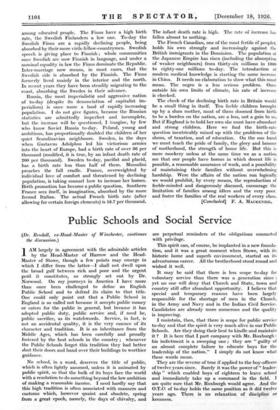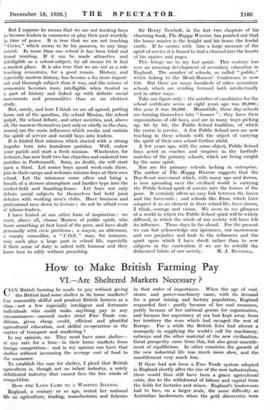Public Schools and Social Service
(Dr. Rendall, ex-Head-Master of Winchester, continues the discussion.) 1 AM largely in agreement with the admirable articles by the Head-Master of Harrow and the Head- Master of Stowe, though a few points may emerge in which I differ from the latter—I shall not dwell upon the broad gulf between rich and poor and the urgent peril it constitutes, so strongly set out by Dr. Norwood. On my journeys in America. I have more than once been challenged to define an English Public School and to defend its claim to that title. One could - only point out that a Public. School in England is so. called not because it accepts public money or caters for the public in general, but because it has adopted public duty, public service and, if need be, public sacrifice, as its watchwords. Service, in fact, is not an accidental quality, it is the very essence of its character and tradition. It is an inheritance from the Middle Ages, which has been carefully and proudly fostered by the best schools in the country ; whenever the Public Schools forget this tradition they had better shut their doors and hand over their buildings to worthier guidance.
No school, in a word, deserves the title of public, which is often lightly assumed, unless it is animated by public spirit, so that the bulk of its boys face the world with a resolution to do something beyond the low ambition of making a reasonable income. I need hardly say that this high tradition is often associated with manners and customs which, however quaint and obsolete, spring from a great 'epoch, namely, the days of chivalry, and are perpetual reminders of the obligations connected with privilege.
This spirit can, of course, be implanted in a new founda- tion, and it was a great moment when. Stowe, with its historic home and superb environment, started on its adventurous career. All the brotherhood stood round and wished it well.
It may be said that there is less scope to-day for voluntary service than there was a generation since ; yet no one will deny that Church and State, town and country still offer abundant opportunity. I believe that special and temporary reasons have been largely responsible for the shortage of men in the Church, in the Army and Navy and in the Indian Civil Service. Candidates are already more numerous and the quality is improving.
I maintain, then, that there is scope for public service to-day and that the spirit is very much alive in our Public Schools. Are they doing their best to kindle and maintain it ? It is here that I part company with Mr. Roxburgh : his indictment is a sweeping one ; they are " guilty of an almost complete failure to educate boys for the leadership of the nation." I simply do not know what these words mean.
They are the reverse of true if applied to the boy-officers of twelve years since. Surely it was the power of " leader- ship " which enabled boys of eighteen to leave school and immediately take up a command in the field. I am quite sure that Mr. Roxburgh would agree. And the O.T.O. of to-day holds the same position as it did twelve years ago. There is no relaxation of discipline or keenness. But I suppose he means that we are not teaching boys to become leaders in commerce or play their part worthily in time of peace. It is true that we are not teaching " Civics," which seems to be his panacea, to any large extent. In more than one school it has been tried and found wanting. If it can be made attractive and intelligible as a school-subject, by all means let it find a modest place. It is also true that we are not as a rule teaching economics, for a good reason. History, and especially modern history, has become a far more import- ant and thorough subject than it was, and the science of economics becomes more intelligible when treated as a part of history and linked up with definite social movements and personalities than as an abstract study.
But, surely, and here I think we are all agreed, putting home out of the question, the school Mission, the school pulpit, the school debate, and other societies, and, above all, the masters themselves (not only or chiefly in the class, rooms) are the main influences which awake and sustain the spirit of service and mould boys into leaders.
It is hinted that missions which started with a strong impulse turn into humdrum parishes. Well, endow your parish and start a fresh mission. Winchester, for instance, has now built two fine churches and endowed two parishes in Portsmouth. Soon, no doubt, she will start upon a third. Let senior boys spend week-ends there, join in their camps and welcome mission boys at their own school. Let the missioner come often and bring a breath of a sterner atmosphere and hardier type into the cricket-field and boarding-house. Let boys not only debate social subjects by theniselves but hold' joint debates with working men's clubs. Have business and professional men down to lecture ; do not be afraid even of labour-leaders.
I have hinted at one ether form of inspiration : we must, above all, choose Masters of public spirit, who know something at first hand of the poor, and have dealt personally with civic problems ; a mayor, an alderman, a county councillor, a " C.O.S. " man, for instance, may each play a large part in school life, especially if their sense of duty is salted with humour and they know how to edify without preaching. Sir Henry Newbolt, in the last two chapters of his charming book, The Happy Warrior, has pointed out that the house master is the knight and his house the feudal castle. If he carries with him a large measure of the spirit of service it is bound to find a channel into the hearts of his squires and pages.
This brings me to my last point. This century has seen an amazing development of secondary education in England. The number of schools, so called " public," which belong to the Head-Masters' Conference is now 150. But there arc many hundreds of other secondary schools which are striding forward both intellectually and in other ways.
Take one figure only : the number of candidates for the school certificate seven or eight years ago was 20,000 ; this year it was 53,000. MeanWhile, these day-schools are forming themselves into " houses " : they have their organizations of old boys, and are in many ways picking up, bit by bit, the Public School tradition, of which the centre is service. A few Public School men are now teaching in these schools with the object of carrying the spirit of their own school further afield.
A few years ago, with the same object, Public School boys acted as coaches and umpires in the football- matches of the primary schools, which are being caught by the same spirit.
• Nor are the primary schools lacking in enterprise. The author of The Happy Warrior suggests that the Boy-Scout movement which, with many ups and downs, is new spreading over the civilized world is carrying the Public School spirit of service into the homes of the poor. It certainly offers 'an easy link between the haves and the have-nots ; and schools like Eton, which have adopted it as an clement in their school-life, have shown, I think, courage and vision. We seem to see glimpses of a world in which the Public School spirit will be widely diffused, in which the whole of our society will have felt its influence. Those days lie far ahead. For the present we can but acknowledge our ignorance, our narrowness and our prejudice and look to the influences and the spirit upon which I have dwelt rather than to new subjects in the curriculum if we are to rebuild the dislecated fabric of our society. M. J. RE:4DALL.











































 Previous page
Previous page